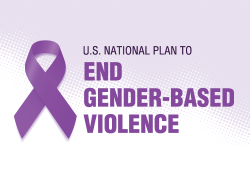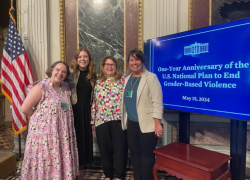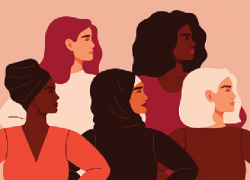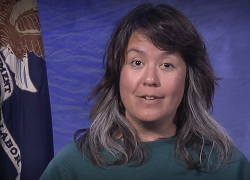Gender-based violence and harassment (GBVH) in the world of work is pervasive across all industries and occupations in the United States and around the world. Globally, more than 1 in 5 workers has experienced violence and harassment at work.
In the United States, anywhere from 25% to 85% of women report having experienced sexual harassment in the workplace. Overall, the rate of women’s sexual harassment charges per 100,000 employees is higher in male-dominated industries like mining, quarrying, and oil and gas extraction; warehousing; and transportation. However, the total number of sexual harassment claims filed with the U.S. Equal Employment Opportunity Commission are highest in the industries that employ large numbers of women, with the top being the accommodation and food services industry, followed by retail trade.
As unsettling as these figures are, they only represent the reported cases. Due to the fear of retaliation, limited access to legal and supportive services, and a variety of other harmful norms still present in jobs today, many incidents of GBVH continue to go unreported.
Persistent rates and reports of GBVH in the world of work are why we are joining the 16 Days of Activism Against Gender-Based Violence campaign again this year, alongside workers, advocates, unions, employers and other government agencies, to continue to listen, raise awareness and call for the elimination of GBVH. We must shine a light on this violence and lift up survivor-centered and trauma-informed best practices that effectively prevent and respond to GBVH.
Over the past year, the Department of Labor’s Women’s Bureau has been leveraging its convening, grantmaking and advocacy powers to end GBVH in the world of work and ensure survivors’ voices are represented in the public policy process. For example, when asked how to get more women into trucking to help solve our nation’s supply chain issues, the Women’s Bureau amplified the voices of women drivers rightly concerned about women entering an industry with rampant and unchecked sexual violence and harassment. In April, we answered the Biden-Harris Administration’s call for a Day of Action to Raise Awareness and Prevent Sexual Assault and Sexual Harassment in the Trucking Industry by securing commitments from numerous industry stakeholders to take concrete actions to prevent and respond to such violence, as well as by holding a virtual roundtable on the topic with workers, federal partners and other industry stakeholders.
In the similarly male-dominated infrastructure industry, the Women's Bureau has also been highlighting the issue of GBVH. Our Equity in Focus Summit in September brought together representatives from the private sector, unions, state and local government, workers, and other stakeholders to share strategies on how to use federal funds to increase job quality and advance equity in the workplace. One of the key takeaways from the summit was clear: Addressing GBVH in the world of work is an essential component of securing equitable, safe, quality jobs.
Through our grantmaking authority, we award funds to organizations connecting low-wage and marginalized women workers to services, benefits and legal assistance as part of our Fostering Access, Rights, and Equity grant program. One grantee, the Western North Carolina Workers’ Center, is using its funding to help prevent and address the widespread GBVH occurring in western North Carolina’s poultry industry. Specifically, it aims to deconstruct the systems that perpetuate fear, violence and harassment in the poultry industry, while helping empower women and survivors who are predominantly Latina and Asian immigrant women workers.
Most recently, the Women’s Bureau has been collaborating with the International Labour Organization’s Office for the United States and Canada to participate in a series of roundtables to explore how collaboration and strategy can help eliminate GBVH in the United States. The series, Uniting to End GBVH in the World of Work, emphasizes the meaningful and lasting change we can make in our communities when governments, workers, unions, employers, and advocates act in tandem. The next roundtable on Dec. 7 will feature worker-led education and awareness efforts to make our world of work safer for all workers by enacting culture change, addressing structural risk factors, and centering worker voices in solutions.
During these 16 Days and beyond, we invite you to join these efforts and unite with us. Together, we can make systemic changes that eliminate the harmful norms that perpetuate violence and harassment. Together, we can expand access to safety and support for survivors, while investing in promising prevention measures. Together, we can empower workers and survivors. A world of work free from GBVH doesn’t have to be something we just strive for — together, we can make it the new reality.
Amy Dalrymple and Katrin Schulz are policy analysts in the U.S. Department of Labor’s Women’s Bureau. Follow the Women’s Bureau on Twitter: @WB_DOL

 U.S. Department of Labor Blog
U.S. Department of Labor Blog




